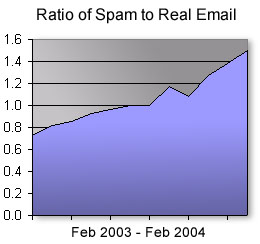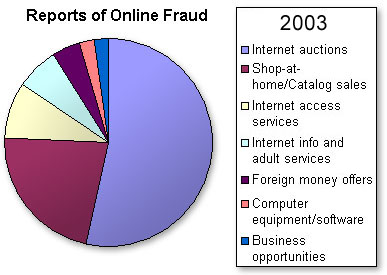261 Broad Street
Windsor, CT 06095
(860) 285-0172
support@invisiblegold.com
Your Website Should Be Easy to Edit
Windsor, CT 06095
(860) 285-0172
support@invisiblegold.com
Your Website Should Be Easy to Edit
What Can You Do To Avoid Online Fraud?
"Willie, why do you rob banks?" -- "Because that's where the money is" - Willie Sutton, notorious bank robber The Internet is an exciting place these days. Online commerce is rocketing up. The recording industry is chasing after college students, and there is a startling increase in online crime. The Federal Trade Commission reports online losses of $437,000,000 in 2003. That's a 40% increase since 2002, and most important - it hit the web-savvy 18-39 year old crowd the hardest. Buying a paper shredder and knowing your way around the Internet is not enough - it's time to develop some online street smarts. |
PHISHINGYour biggest risk is identity theft. It isn't considered online fraud, but often involves email and a website. There's a common practice called "phishing" where you get an email from someone important (like your bank, PayPal, Ebay, etc.) asking to update personal information. It has a real return address and the link goes to an official looking website. Everything seems reputable but it isn't. You just gave your information to a criminal.Lesson: This trick plays on the fact that it is quite easy to copy graphics to make a website that mimics a real one. The message goes out to thousands of people and several fall for it. Don't give out personal information like credit card numbers, social security number, or passwords unless YOU initiate the communication.
|
BOGUS AUCTIONSAuctions make up more than half of the online fraud cases. Basically you win an auction, send in your money, and nothing comes in the mail.Lesson: Buy from Ebay and check a vendor's approval rating. Skip anyone that has negative or a small amount of feedback. Use PayPal because you determine how much money is sent rather than a credit card which is like a blank check. Accept the fact that online auctions are risky. Accounts can be stolen and you might not be buying from the person you think you are. |
STOLEN PASSWORDSYou sign up for online banking and everything is great. You transfer money, automatically make payments, and more. The website is secure and password protected. Next, you sign up for something else online and suddenly all of your money is gone.Lesson: You've got to protect your passwords. This means making them difficult to guess (letters and numbers). It also means not using them too often. The best practice is to have super secure "money" passwords, and weak "general use" passwords.
|
FAKE ONLINE STORESYou discover an online store that sells expensive golf balls at a massive discount. It has trendy looking graphics, an impressive inventory, and a nice looking shopping cart. However, your order never arrives and three weeks later the website is gone.Lesson: You've got to use different techniques to size up a company online. In the real world it's easy to tell when someone is invested in a business. Think of a fancy retail store with inventory, expensive rent, and expensive marketing. They aren't as likely to run away with your $200 as a street vendor that can disappear overnight. Try giving the company a call. Send them an email with a question. You can learn alot by hearing a person's voice. Don't let this article scare you. We're all like tourists in a newly discovered world. The Internet is a great place to shop and have fun as long as you are smart about it. Contact us if you'd like help in setting up a website that protects your clients' private information. |



